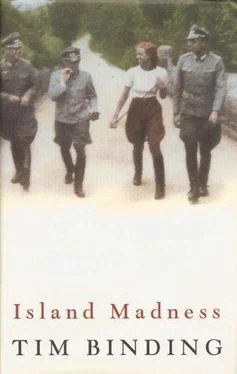“Don’t hit me,” Monty Freeman squealed, his arms floundering in clouds of white. “I’ll tell you everything.”
They dragged it out of them that night and most of the next day, Ned and the Major, with the Captain’s men working on the Kanoniers. “Never thought I’d feel sorry for a German,” Tommy told him, in the late morning, having coming back from where the soldiers were being held, “but seeing the state of them…They even asked me if I wanted to join in. Held one up for me.”
“And did you?” asked Ned, remembering poor Schade. Tommy was indignant.
“I got out of it, told them I was saving my energy for this lot back here.”
This was how it worked, how George and Monty and Elspeth spilt it out, Elspeth snuffling beside her father in Ned’s office, Monty Freeman babbling in the doctor’s room below, staring at the white line, thinking how easily he had lost his own balance and how, unlike the transitory drunk, it was an equilibrium he would never regain. They talked freely, recklessly, in the vain hope that such confessional cooperation would somehow weigh in their favour, that they might escape the strictures of a German prison. They were wrong in that, Ned knew, but he made no attempt to dispel their straw-grabbed illusions.
The set-up had all been Elspeth’s idea, George boasted, Elspeth and the Lieutenant’s. Between them they had arranged everything. George supplied the transport, and the means by which to distribute the goods around the island. Elspeth provided the one thing that would entice the Kanoniers into such a dangerous occupation. Girls. The Lieutenant had elected the boat crew and obtained the goods from the mainland. Between them they had the island sewn up.
Elspeth would meet the girls on Thursday evenings after the shops closed. They’d go down to her mum’s shop and have a kip for a couple of hours. There were three others apart from Elspeth, two girls from Boots and the caretaker’s daughter up from the big school. They’d wake around seven, have a wash and a good tea before changing out of their working clothes into something more suitable. George would piek them up in his van at about half eight and run them over to the point. Once out on the headland it was no more than a thirty-yard dash across the scrub to where the lid of the escape hatch stood open and, skirts flapping, they’d giggle down the iron ladder to where the straw and the soldiers waited, the three gunners Rupp, Bauer, and Laurer and their fun-loving Lieutenant.
Sometimes the parties could be quite sedate. They all liked playing draughts and as often as not they’d have a small tournament with betting on the side; the girls would darn the men’s socks, play cards, sit on their knees, listening to their halting tales of home; maybe they’d sing songs, tune into the radio, spoon close up to distant band music, their arms around each other’s necks, lipstick and hair cream, lipstick and hair cream, shuffling past each other like strangers on a dance floor. Later, couple by couple, they’d slip into the tunnel to make love, but by curious convention, when it came to Elspeth and the Lieutenant’s turn, the others would troop out of the room altogether and wait in the gun room. Elspeth and the Lieutenant had business to discuss as well.
At other times, opening that hatch was like taking the top off a shaken bottle of pop. Then they did run riot, all bloody night. “Like being in a cage with wild animals,” Elspeth said with some sense of wounded awe, “you had to meet them halfway, just to survive.” Those were the nights of cheap brandy, of drinking contests and nude wrestling, of the girls marching up and down the corridor to the hoarse cheers of linksrecht linksrecht linksrecht , with army rifles slung across their bouncing breasts, standing to attention in mock parades before the boys took turns with each of them, on the bunk beds and in the gunner’s chair, even draped over the muzzle of the gun itself. Then came the photographs. Schade had started taking them eighteen months back, just faces at first, couples arm in arm; then the odd exposed moment caught unawares, a blouse half-pulled over a head, a giggling body hastily covered by a blanket, two pairs of bare feet, then as they tried to dig out of the pit of boredom, something more deliberate, more orchestrated. The men had stuck the more innocuous on the back of their cupboard door. Others they kept in their lockers. (They had burnt all of them in the black stove minutes after Ned and the Major had left that Sunday.) By early morning the party would have subsided and they’d all be sleeping, or if not sleeping, talking quietly, couples again, lying amongst the detritus of their energy, waiting for dawn, when the cargo boat from St Malo would appear, stopping off on its way to Peter Port at the half-submerged jetty on the cove at Gull Bay where Schade and his bleary-eyed Kanoniers waited. The girls would be in the gun room then, wrapped up in greatcoats, watching those few wallowing minutes as the boys hauled the crates off the deck and dragged them up the steep path to one of the construction sites dotted along the cliff top, before the charged run back to the bunker, where the girls would squeal with the shock of freezing hands and wind-blown faces and one final copulation, taken quickly, as one might swallow a tot of rum. Then it was dressing and clearing up, the girls sweeping out and washing up and brushing down straw-infested blankets, while the Kanoniers, ever soldiers, tended to their uniforms and the mocked machinery of war. When the coast was clear the girls were helped up the ladder and gone, running across the scrub and down the hill to the safety of George’s sister. There they would change and wash and put on their working clothes which George had left there the night before and catch a bus for town. Their part was over until the next time.
“But why not ship the goods through the harbour?” Ned asked him. George was eager to take him into his confidence.
“Too risky, Mr Luscombe. Crates have a nasty habit of busting open and besides, they’re always having spot checks down there. But once you’ve got past, no one gives them a second glance.” His eyes glittered.
George came for the crates the same day. They were safe standing alongside the other requirements of his work. He’d load them on his van and take them back to the yard. Saturday morning, alone, George would break them open. By the day’s close the goods would be safely stored in the bank vault under Smith Street.
It was a sweet, uncomplicated arrangement, a simple matter of barter, no different from the exchanges offered in the evening press. Everyone got paid in kind; the girls in parties and stockings and parcels of food; the Kanoniers in girls. The boat crew got a flat fee. Monty Freeman had been doubly fortunate, lured in by exhausting after-hours intercourse in the sanctity of his locked office, and later, as the business flourished, cash too. “He’s a dirty little bugger,” Elspeth said, forgetting the bank manager’s height, “insisted on wearing those rubber counting tips we use on his fingers, you know, to touch me privates with them,” but she kept him sweet nevertheless, for Monty had been important. Monty gave them the perfect hiding place. Monty watched his bank account swell. Monty sat Elspeth in his swivel chair, wriggled his fingers and cursed his spineless luck.
That last Thursday they’d had what was going to be the final shipment for a month. Schade was due to go on leave—to Cherbourg to drum up more business. The shipment was a special one. Something they had been waiting for for a long time. There was a coyness to George’s voice now, an almost childish quality.
“Special?” Ned asked. “How do you mean, special?”
George looked embarrassed. He looked back to his daughter, who shrugged her shoulders. “Custard,” he said.
Читать дальше












